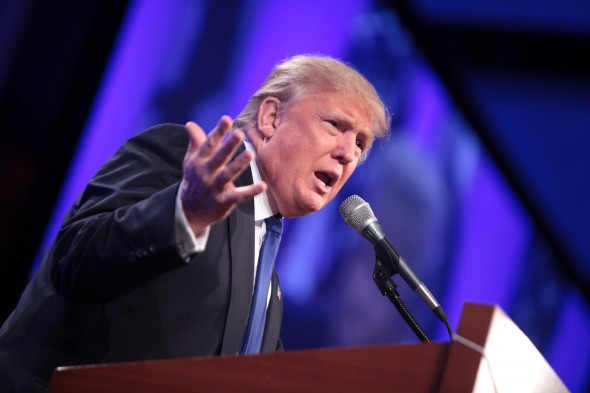How did Donald Trump get here? It’s simple: Aside from facing an incompetent opponent, he won over large swaths of the electorate with brazenly nativist rhetoric. By denigrating undocumented immigrants and refugees at every turn, he stirred up enough xenophobic fear to reach the presidency. But the platform he stands on isn’t as sturdy as it may seem. Thanks to the policies he’s put forth since the election, Trump and his nativism might not retain popularity.
Trump isn’t the only right-wing demagogue who’s gained steam as of late. Looking across the pond gives us some analogues to the president-elect. In France, Marine Le Pen, who helms the far-right National Front, has a good shot at winning her country’s 2017 presidential election. Meanwhile, the Netherlands’ Geert Wilders and his Party for Freedom may rise to power in their elections next year. Each of these charismatic politicians, like Trump, has propagated Islamophobic nativism and could soon capitalize on that.
But what sets Le Pen and Wilders apart — and what’s led to their success — is the calculating way they go about their demagoguery. As the journalist Sasha Polakow-Suransky outlined earlier this month for The Guardian, they’ve both reached out to demographics that don’t typically swing for the right. Le Pen and Wilders paint Islam as a sexist, homophobic and anti-Semitic ideology; by standing up to these immigrants, they purport to be the defenders of an enlightened, progressive society. Furthermore, they push for a strong welfare state and health care system, which they argue immigration will put further strain on. Selective social liberalism and a quasi-populist economic agenda have given Le Pen and Wilders a broad coalition and, perhaps, ruling power in their respective countries.
Of the many words that can describe Trump, “calculating” doesn’t make the list, suffice to say. He beat Hillary Clinton, sure, but most Americans don’t like him; Gallup rates his favorability as being far lower than that of the prior three president-elects. Most post-war presidents have become less popular during their tenure in the Oval Office, so Trump probably won’t improve his current standing.
During his presidential run, Trump indicated he might adopt the progressive facade of his European counterparts. He waffled on LGBT rights and abortion, an unprecedented move for a Republican candidate. And after the Orlando shooting in June, when a gunman pledged allegiance to the ISIS before killing 49 people at a gay nightclub, Trump warned that Muslim immigrants have “hostile attitudes toward women, toward gays, and people of different faiths,” a statement that Le Pen or Wilders would likely agree with.
This approach didn’t pay much dividends at the ballot box, though. Exit polling data suggests Trump won only 42 percent of female voters, which doesn’t diverge by much from previous Republicans; he also earned a meager 14 percent of the LGBT vote, far lower than any GOP nominee this millennium. Mike Pence, his vice president-elect, has an abhorrent record on women’s and LGBT rights, as do several of Trump’s advisers and transition team members. With this sordid crew surrounding him, Trump will have a difficult time matching the diverse support of Le Pen and Wilders.
In addition to nominal appeals to traditionally left-leaning groups, Trump talked up his populist bona fides on the campaign trail as well. He repeatedly emphasized the importance of infrastructure spending, going so far as praising the New Deal. Going against Republican orthodoxy, he swore to maintain a health care system of some sort and keep Medicare and Social Security intact. These promises actually worked as 67 percent of whites without a college degree picked Trump — a historic rate that was one of the biggest reasons for his victory.
Since clinching the presidency, however, Trump has shown his true colors on all those pledges. His proposed infrastructure plan entails more tax cuts for corporations and aren’t guaranteed to actually, you know, fix the infrastructure. Despite purporting he’ll hold onto some parts of the Affordable Care Act, he’s moving closer to the draconian party line on health care. Speaker of the House Paul Ryan has taken the reins on Medicare, which he’s long dreamed of cutting, and Trump’s transition team appointments suggest he’ll renege on Social Security too. Working-class whites won’t stick by Trump’s side after he stabs them in the back, no matter how much xenophobia he spouts.
Trump has demonstrated that nativism has a sizable base; however, bile alone won’t keep him popular. Where Le Pen, Wilders and other far-right politicians take a cunning approach to vilifying immigrants, Trump disregards strategy and says anything that’ll help him now, without any regard for what he’ll do later. As I’ve explained here before, malice and stupidity among Republican politicians are not mutually exclusive. When Trump runs for a second term in 2020, he might find himself in a tougher fight than he signed up for.
Ryan Romano is a sophomore journalism major. He can be reached at tripler26@gmail.com.



